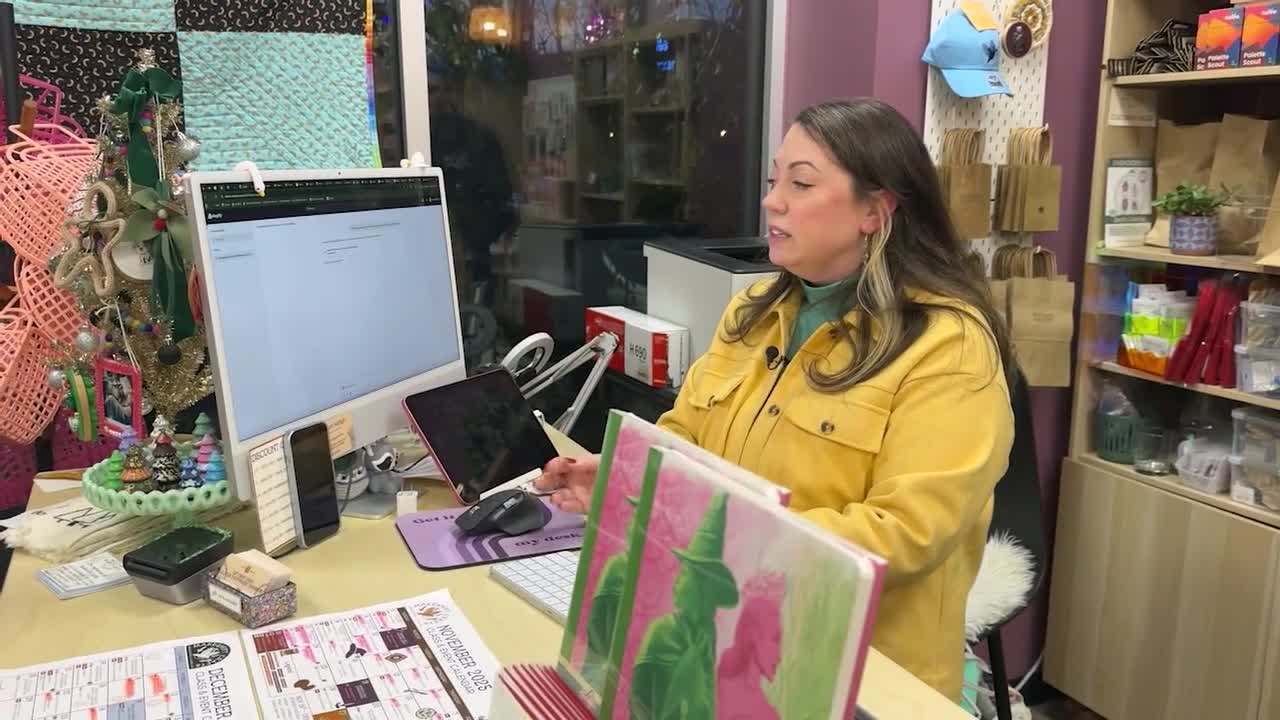WESTMINSTER, Colo. — After a career in the financial technology (fintech) industry, Brittany Naylor was feeling burnt out.
“Through the volatility of the pandemic, a lot of jobs, especially in the tech sector, really, really struggled,” she explained. “You know, there were mass hirings and then mass layoffs. And I've been involved in a lot of that.”
She described a seemingly never-ending cycle of job interviews last fall, and says it even affected her physical health.
“It just felt like, ‘I cannot do this anymore, like this is literally gonna kill me,’” she told Denver7.
So Naylor decided to pivot and turn her passion project into a small business. She opened Makeshift Crafts in Westminster in May, telling Denver7 it’s been a dream of hers since she was 17.
It’s more than just a craft store. Naylor calls it a “safe haven” for the community to gather together to spend time working on crafts. It hosts events like movie nights and frequent “non-perfectionist” workshops.

“Art and creativity can really support mental health,” Naylor said. “It’s really cool just to see the worries and the stress melt away off people's faces as they're sitting here.”
A woman attending a workshop, Philadelphia Morgan, expressed her appreciation for the environment inside the store.
“This summer, there was an opportunity for a summer camp,” she explained. “And my younger daughter has autism, so summer camps can be challenging sometimes with people who don't really understand diversity. And both girls came, and it was like their favorite summer camp ever. We live half an hour away, so it was like a trek every day. But they love coming here.”

Employing AI
Naylor says she has to find ways to make her staff members available to customers when they are in the store to help curate the friendly atmosphere.
One way Naylor does that is by using technology and artificial intelligence to take care of some of the work behind the scenes.
“There's no doubt in my mind that's what we need to do to help us scale the business and not lose our minds,” she said with a laugh.
Naylor says she and her staff frequently use tools such as Shopify and Trello to analyze sales data, deliver personalized email campaigns, organize workshops and more.
“Other businesses would have a whole data analyst dedicated to telling me that information,” Naylor said after asking AI for sales data for a product and receiving it seconds later. “Or, I could run a report and try to figure that out myself, it would probably take me, personally, like days,”
Naylor estimates the roughly 15 tools combined cost around $500 a month, but save the staff countless hours of work and save the business thousands of dollars in payroll.
“I need good people here in the store with my customers,” Naylor explained. “And I don't need to just pay people for the sake of paying people to get stuff done the right way, or to just not do it, which is a lot of the small business mentality… I want that experience to be really, really good for everyone, whether this is your 50th time in or your first time in.”
A Growing Trend
Naylor is not alone.
A survey from the National Federation of Independent Business from earlier this year found nearly 25% of small business owners are using AI for business.
The U.S. Small Business Administration also shared some of the potential benefits and risks of AI for small businesses.
“The ability, particularly for a small business owner, for [AI] to uncover trends that maybe we hadn't thought of, is a really, really valuable asset,” Metropolitan State University professor and AI expert Sam Jay told Denver7. “The machine is better at recognizing that trend, because it can take this 30,000 foot view of all of that data and provide that insight. Maybe you're a little bit too close to it and it's hard to see.”
Jay also says generative AI now provides the ability to distill something like data in an Excel spreadsheet and explain it in a conversational way.
“Previously, I would have had to understand zeros and ones and code and all these stuff, all these things to get an application to do the thing that I'm talking about,” he explained. “Now, all I have to do is use human language… It will right spit out, ideally, the instructions that I would follow to build an app, to take a product to market, [to answer] ‘What are my blind spots?’”
Jay predicts more and more small business owners will continue to adopt the technology to help their business grow or even to start one entirely.
Denver7 asked Naylor if she is worried about being overly reliant on the AI tools to take care of work, in case they fail or for some reason are no longer an option in the future.
“So far, we haven't been burned by tech,” she replied. “I’m not really worried about it, because at the end of the day, I know that my business isn't based on technology. It's based on people, people and community and the connections that we're building here with that.”





